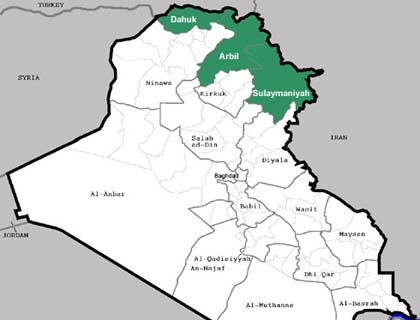The situation in Iraq continues to be volatile. The government of Nouri al-Maliki has found itself in the eye of storm following the recent wave of political unrest that threatens to derail the nascent political understanding among the three main political groups: the Shias, the Sunnis and the Kurds in the Northern territories. The dream of a politically stable and peaceful post-Saddam Iraq has long been shattered.
So has the notion peddled by the Bush Administration that democratization of a free Iraq will come only natural to Iraqis who had long languished under the iron fist of Saddam and his cohorts. The political carnage in Iraq is distinctly an intense power rivalry among these three main groups.
The Sunnis who once had held heads high under Saddam now perceive the majority Shias as the victors of a brutal "power grab" that has made the Sunnis the losers of the game. Kurds in the North have come to enjoy a relative extent of autonomy although the central government in Baghdad wants undisputed authority in the Kurdish regions.
The control of airports in the Kurdish regions has been the subject of power skirmishes between the Kurdish administration and the central government in Baghdad. What, however, has heightened the tensions to unprecedented levels is the issue of Tariq al-Hashimi, the former vice-president and who the al-Maliki government accuses of being involved in a series of bombings that targeted Iraqi security forces and government targets in recent years.
Tariq al-Hashimi, who had taken refuge in the Iraqi Kurdistan, flew to Qatar after Baghdad had repeatedly urged the Kurdish officials to hand him over. Tariq al-Hashimi's flee now threatens to yet open the floodgates of increased tensions which further strains and destroys whatever remains of an inter-Iraqi understanding and political accommodation.
After an understanding that was reached between the leaders of major Shia and Sunni political groupings in 2010, the Shia leaders had agreed to a power-sharing deal in which power was to be shared among the three main political groups.
This deal, however, was quick to melt away when the Nouri al-Maliki government refused to hand over the reins of defense of security ministries to Sunnis. That opened a new chapter of post-Saddam Iraq that saw relations between these two groups plummeting to new lows.
The Kurds in the north have now entered directly into the fray after the al-Hashimi episode. The Kurds tend to fiercely resist what they perceive as unjust hegemony of Arab-dominated central government – a legacy of decades of post-British political organization in Iraq that saw the Kurdish political and cultural identity fragmented and in disarray. The Kurdish leaders in northern Iraq routinely point out what they call "just Kurdish struggle for freedom".
The future of Iraq now stands as uncertain as the does the future of Iraqi politics. The partial and half-baked political understanding that major Iraqi political groups had reached now stands on the brink of going down under.
Massoud Barzani, the President of the Kurdistan region, is at loggerheads with the Nouri al-Maliki government - the plan of power-sharing between the two camps now lies in ruins. The Sunnis of Iraq now take comfort in the fact that they have the Kurds too as the aggrieved party in the face of what both perceive as Shia hegemony.
Oil is another issue that has further complicated Iraq's political chessboard. The central government in Baghdad has time and again warned the foreign companies that it would deny them Iraqi oil contracts if it finds them in unilateral deal with the Kurdistan region government.
The happenings in Iraq and the country's political situation is, in actuality, a function as well as a reflection of the broader regional dynamics whereby the resurgent brand of Shiism backed by Iran is in confrontation with what Saudi Arabia, Qatar and Turkey endeavor to effect in the Arab world.
Iraq has gradually turned into the arena for a Cold War between these two divergent poles. Iran regards Iraq as strategic to its long-term interests in the broader region. In the heat of the turf wars and the broad-based clash of ideologies between the two regional powers, Iraq has had its own share of being in the spotlight.
The Sunnis in Iraq are largely aligned with the Arab current that runs through the Middle Eastern politics. The Shias remain under the influence of Iran. The Sunnis in Iraq and for that matter, in the broader Middle East, loath what they perceive as Iranian-sponsored resurgence of Shias.
The coming to power of Nouri al-Maliki and the Shias in Iraq has been the epitome of the resurgence of Shias as far as the Sunnis are concerned. Saudi Arabia and other like-minded Arab governments are bent on weakening the al-Maliki administration in Iraq.
For them as well as the Iraqi Sunnis, the al-Maliki administration is an enterprise being managed by Iranians that seeks the goal of consolidating and concentrating power in the hands a small group of Shias. For them, that administration is spearheading the march of Iraqi government towards becoming a full-fledged totalitarian regime controlled by Shia elite. This is how the Sunnis in Iraq and much of the region perceive the way the government in Baghdad has been trying to consolidate its position and extend the writ of the central government.
The intense power rivalries on the Middle Eastern chessboard between Iran and Saudi Arabia have been further complicated by the rise to prominence of Qatar and Turkey's claim to regional leadership. The happenings in Syria have made it abundantly clear that neither Iran nor the Saudi Arabia-Qatar axis is willing to compromise on their positions. What is interesting is that the situation in Iraq bears distinct similarities to the situation in Afghanistan.

